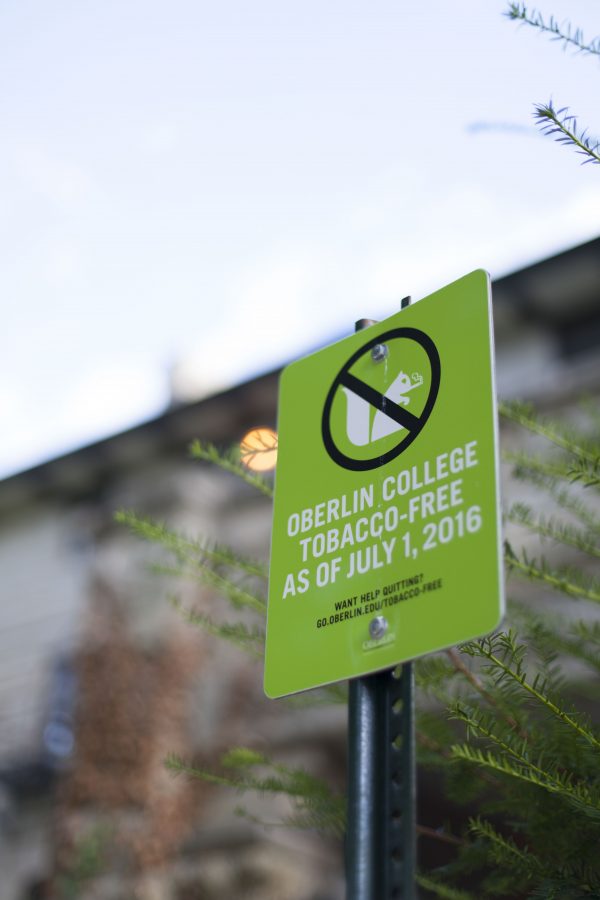Tobacco Ban Carries Little Weight with Smokers
One of the new no tobacco signs stands next to Wilder Main. The tobacco ban went into effect on July 1.
September 2, 2016
In years past, Oberlin students lit their cigarettes on campus and left a trail of smoke on the way to class and huddled around trash cans for makeshift ashtrays. The tobacco ban that went into effect July 1 was intended to curb that behavior, but according to some students, it has been less than successful.
“I’ve seen tons of people smoking outside on stairways and all over campus,” said Diana Schwam, South Hall RA and Conservatory sophomore. “I get that it’s a restriction, and for some students that’s really hard, but I also think that we are all young adults and we need to learn boundaries and to respect the rules.”
The tobacco ban prohibits the use of any tobacco products by students, faculty, staff and visitors, according to the Office of Wellness. The ban includes cigarettes, cigars, pipes, clove cigarettes and hookah, as well as any form of smokeless tobacco, such as dip, chew, snuff or snus. E-cigarettes and vaporizers are not banned under the policy and are still permissible if used 30 feet away from any buildings on campus.
As part of the new initiative, Student Health Services and the Counseling Center are offering cessation tools and educational materials to anyone on campus who is looking for help quitting. Student Health also distributed an informational pamphlet to every student mailbox.
As of last year, roughly 20 percent of Oberlin students smoke cigarettes, according to the Tobacco Ban Implementation Committee.
Interim Vice President and Interim Dean of Students Meredith Raimondo stressed that the college wishes to make the policy educational and helpful rather than punitive.
“The goal this fall is to focus on the health implications,” said Raimondo. “So we are going to really be promoting cessation resources this fall and into the spring. The goal is to try to help people who are interested in finding out about cessation resources — and that’s both students and employees — and figuring out how they can both access those resources and use them in whatever way works for them.”
Raimondo added that even though Safety and Security will be enforcing the policy, the administration hopes that everyone in the community upholds the ban so it takes effect.
“It needs to be a community responsibility program rather than an enforcement issue through Safety and Security — I don’t think that would work. It just becomes one more rule to break,” Raimondo said. “It really has to be students, faculty and staff in conversation with each other so that if somebody is smoking on campus in a space that they shouldn’t be, that we all feel like we have a responsibility to talk to the person about the potential impact.”
Director of Safety and Security Marjorie Burton said that Safety and Security will fulfill the same role it has always played — writing up complaints if they occur but not policing students themselves. Burton added that Safety and Security officers will respond if they see someone smoking on campus, but that there won’t be any aggressive actions to track offenders down.
“It’s not our job as Safety and Security to go after students and try to catch them,” Burton said. “It never has been.”
Some students have raised concerns that the smoking ban could drive smokers to the city streets or Tappan Square, turning them into the College’s ashtray. However, local residents who spoke to the Review didn’t seem to feel that way.
“It’s a personal choice,” said Manuel Espinoza, owner of Manuel’s Barber Shop and 52-year resident of Oberlin. “I think the Square itself is so open that you wouldn’t be infringing on somebody else’s right to breathe fresh air.”
Brent Coward, who works at Campbell House Antiques, pointed out that the city only lightly enforces its own tobacco ban. Coward added that he thinks the tobacco ban infringes on student freedom.
“I feel like it’s shackling the students too much. In open air settings you’re really not going to get exposed to second hand smoke to the point where its dangerous or causing harm to anyone.”
Although the administration is hoping to encourage community members to enforce the ban among themselves, some feel uncomfortable with this idea.
Conservatory sophomore Trisha Doo said that although the policy seems like a fine idea, she doesn’t think many people will obey the new restrictions.
“It puts people in awkward positions,” Doo said. “It’s their body. They know what it does to them and it’s not my place to tell them what they can and can’t do. I wish they wouldn’t put that kind of pressure on students.”




















